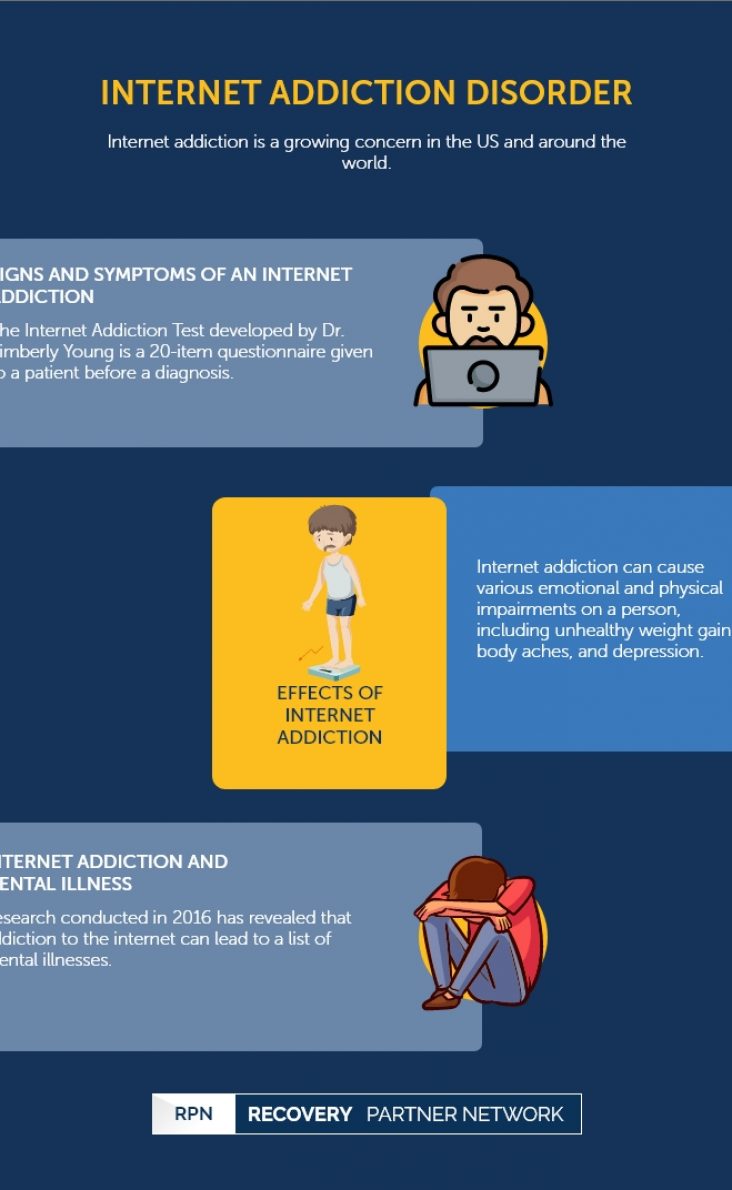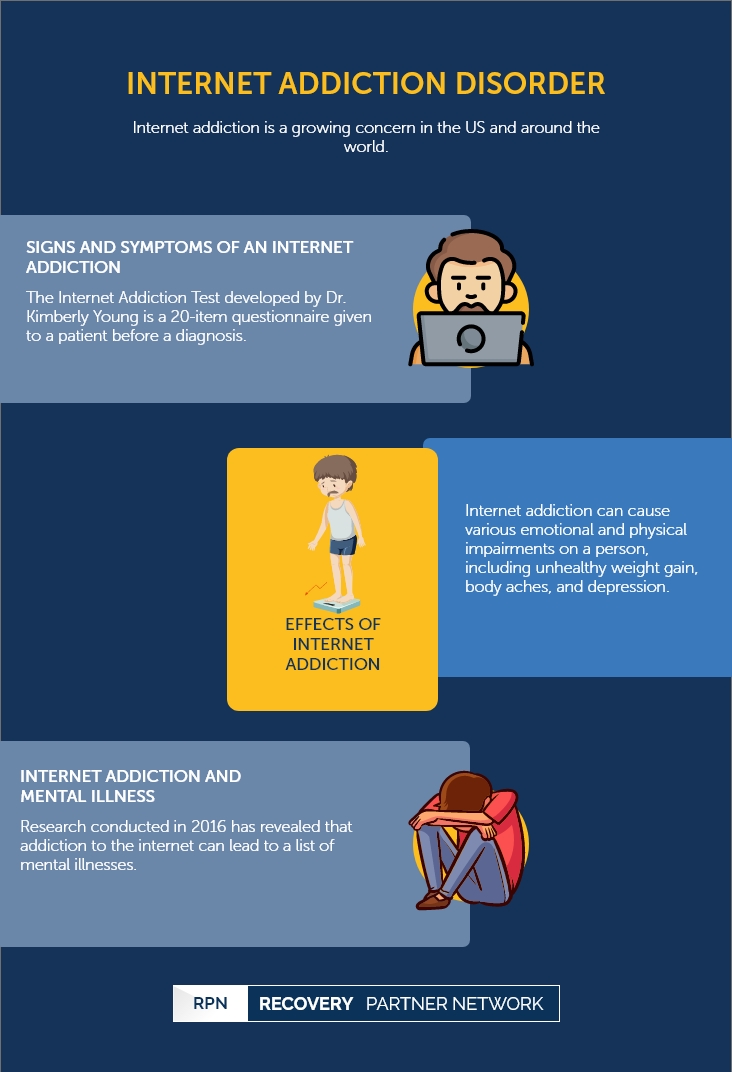Internet addiction is a growing concern in the US and around the world.
Internet addiction disorder
Internet addiction disorder | Table of Contents
What is Internet Addiction?
The internet and computer use are central parts of today’s world. These two factors have changed our lives in many ways. Some of those changes are significant, highly-positive advancements, but a few changes have created adverse outcomes. The world has now understood the effects of the internet on mental health, psychological functioning, and general well-being. Millions of people across the globe spend more hours on the Internet than they engage in healthy activities, leading to a list of global health disorders. Most recent statistics show that about 77% of US citizens use the internet daily. You may assume that spending time on the internet or watching cat videos on YouTube is a harmless act. Yet, some people get addicted to it to a point where they miss out on their day-to-day activities and responsibilities. The use of the internet interferes with their healthy lives. Any habit or action won’t become a hindrance until the person overdoes it. Some internet users even fail to fulfill their lives responsibilities, such as family, work, school, and relationships because of their addiction to the internet.
Addiction to the internet is not yet on the list of the latest edition of the Diagnostic and Statistical Manual of Mental Disorders. However, a study conducted by The National Institutes of Health has already established the addiction in detail. The study has managed to conclude sufficient evidence at the beginning of August of 2017 under this topic. Addiction to the internet or excessive use of the internet has become a threat to the US now. Many medical professionals in the country classify this habit as an impulse control disorder or obsessive-compulsive disorder. Internet dependence, compulsive computer use, and pathological internet use are the names given for this addiction.
FAQ
- How addictive is the internet?
- What is considered internet addiction?
- How do I control my internet use?
Surveys conducted in the United States and Europe have indicated an alarming prevalence rate between 1.5 and 8.2 percent of its general population developing an internet addiction.
Internet addiction is a behavioral disorder where an individual obsessively becomes dependent on internet use and other online devices to cope with life’s stressors.
Begin by removing all temptations to go online such as shutting down devices, putting them to charge in a different room, or unplugging your wifi. Other ways you can control your internet use is by blocking notifications, making a schedule, and sticking by it.
Five Types of Internet Addiction
Internet Addiction is a common term used for a broad range of questionable behaviors. Such behaviors may involve a personal computer and other mobile devices. There are no exact criteria to diagnose an addiction to the internet. However, researchers have listed five subcategories of the internet and computer addictions.
- Cybersex Addiction
- Net Compulsions
- Cyber (Online) Relationship Addiction
- Compulsive Information Seeking
- Computer or Gaming Addiction
Cybersex addiction is prevalent across the globe now. It is a self-explanatory addiction. Sexual fantasy/adult chat-rooms, pornography, adult websites, and xxx webcam services are the elements of it. Even married individuals may have addictions to pornography, and it can lead to serious relationship issues. Dependencies on any of these components can be harmful to the individual’s ability to form intimate, real-world sexual or romantic relationships. The treatment for cybersex addictions comprises of interventions to help the addicted person understand the damage caused. Ongoing or outgoing therapy are the next steps of the treatment process for this addiction.
Net compulsions are among the most dangerous addictions in the world. Online interactive activities, such as trading stocks, compulsive online shopping, gambling, and online auctions, fall within this category, and these habits can lead to adverse financial difficulties and job-related issues. Losing or spending excessive amounts of money can cause stress in relationships and economic problems. Some people are at higher risk of getting addicted to online gambling and shopping, and instant access to such online activities can make things worse. Many websites prey on these vulnerabilities.
This is another online threat that is affecting many thousands of relationships in our community. People who have addictions to these so-called online or cyber relationships either neglect or forget their real family and friends. Typical online relationships take place in chatrooms, social networking platforms, and other online services that facilitate interaction with people online. Some people who rely on online connections don’t even reveal their real identities, which has led to the term “catfishing.” Many people who spend hours chatting with online partners forget and neglect their relationship with real-life friends and family, preferring their virtual life to their real life.
A person with an addiction to online relationships struggles to have real-life connections that are genuine and healthy. The inability to make real-world connections is the downside of this addiction. A point then comes where the person has to rely upon those online relationships as their real-world connections fade away over time due to neglect. Therapy and counseling are the necessary components of a treatment program for such individuals.
The internet provides users with data and knowledge. Unfortunately, even this can turn into an addiction or an urge to organize and gather data. One may assume that gaining experience is a priceless act, but ruining your personal and professional life because of this habit is questionable behavior. This compulsion can turn into obsessive tendencies and result in the manifestation of any pre-existing conditions. In the worst case, this behavior can lead to reduced work productivity and even loss of a job. The right treatment for this compulsive behavior varies, depending on the severity of the addiction. Therapy, coping strategies, and medication are all part of the treatment program.
Addiction to computer games is predominant across the globe. Online and offline gaming that takes place on PCs, mobile devices, and laptops leads to this addiction. Playing online and offline games became a trend with the increased use of the internet. According to many studies, addiction to playing computer games can be considered a health disorder in specific settings. Some young individuals have missed or failed exams because of their addiction to computer games. Due to the lack of healthy activities, these individuals tend to lead an unhealthy lifestyle. Computer game addiction is perhaps the first type of PC/internet addiction, which has become a threat to the modern world.
Signs and Symptoms of an Internet Addiction
Dr. Kimberly Young developed The Internet Addiction Test back in 1998. It is a 20-item questionnaire given to the patient before diagnosis.
This test includes questions such as:
- How often do others in your life complain about the excessive amount of time you waste online?
- How often do you find yourself predicting when you will go online again?
- How frequently do you realize that you stay online longer than you expected?
Clients can answer in the following manners:
- Always
- Not Applicable
- Rarely
- Often
- Frequently
The doctor then calculates the final score, depending on the answers given by the patient, to help measure the severity of the addiction.
Dr. Keith W. Beard also published an article in 2005 on the same topic. He proposed eight factors to consider when evaluating internet addictions. If the patient fulfills five aspects from the eight, he/she may have an internet addiction.
- Has made failed efforts to cut back or stop internet use
- Has stayed online longer than first intended
- Is moody, restless, irritable, or depressed when trying to cut down or stop internet use
- Needs to use the internet with increasing amounts of time in order to gain pleasure
- Has jeopardized or risked the loss of a significant job, relationship, educational or career opportunities because of the internet use.
- Has lied to the therapist, family members, or others to hide the extent of time spent on the internet.
- Uses the internet as medication or a form of escape from problems or of relieving a dysphoric condition; for example, depression, anxiety, etc.
- Is preoccupied with the internet use or often thinks about the prior online session or the anticipation of the next online session
Effects of Internet Addiction
Internet addiction can cause emotional and physical impairments on a person. Unhealthy weight gain, body aches, physical issues, vision problems, Carpal Tunnel Syndrome, and insomnia are the common side effects of this severe addiction. Dishonesty, depression, social isolation, mood swings, aggression, and anxiety are the emotional effects of internet addiction.
FAQ
Internet addiction can cause vision problems, insomnia, body aches, carpal tunnel syndrome, and weight loss/gain. It can also cause emotional effects such as mood swings, aggression, anxiety, dishonesty, and depression.
Internet Addiction and Mental Illness
Research conducted in 2016 has revealed that addiction to the internet can lead to a list of mental illnesses. Troubles with dealing with day-to-day activities, the inability to socialize in the real world, and neglecting school, home, and work-life are the harmful effects of overusing the internet. Patients that show these symptoms struggle with mental health disorders, such as anxiety and depression.
However, a debate persists on whether internet addiction causes mental health conditions. ADHD, impulsivity, poor time management, difficulty planning, and low productivity are common among individuals who spend more hours on the internet. People who have addictions to computer use and the internet are at a high risk of developing co-occurring disorders.
FAQ
- What does internet do to your brain?
- Is internet addiction a mental illness?
- Does internet addiction cause depression?
- How does internet addiction affect relationships?
- How does addiction to technology affect behavior?
Research indicates the internet’s ability to make alterations in regions of the brain linked to cognition and subsequently affecting attention, memory, and social interactions.
Despite gaining serious attention from many researchers, mental health counselors, and doctors, internet addiction is yet to be classified as a mental disorder by the DSM-V.
A new study has found that teenagers addicted to the internet are more likely to develop depression and other psychological problems.
Internet addiction can affect both intimate relationships and relationships between family members. Commonly manifested issues include the breakdown of communication, and failure to meet family responsibilities, which in turn affects the quality of the relationship.
Technology addiction can cause an individual to spend more time in isolation, which could result in poor hygiene, the inability to form real-life connections, social anxiety, and depression.
Recovery Partner Network
We aim to educate and empower. If you feel our library of resources does not cover your specific need, reach out to us, and we would be happy to help.
STATISTICS
© Copyright 2026


